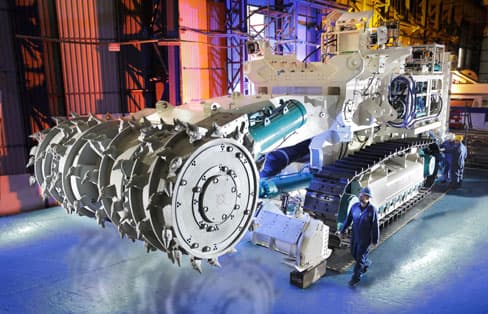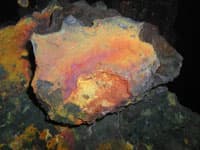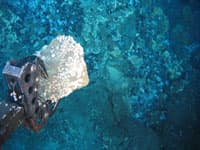Canadian Mining Company could be involved in the world's first deep sea mine
Source: Ariana Kaknivious in Canadian Geographic

The 310,000-kilogram Bulk Cutter is one of the heavy seafloor production tools. (Photo: Nautilus Minerals)
A Canadian mining company has been approved to start extracting ores of copper, gold and other valuable metals on the Pacific sea floor.
The company, Nautilus Minerals, reached an agreement with Papua New Guinea to start mining within the next five years. Nautilus was granted a 20-year licence to excavate at Solwara 1, a site 30 kilometres off Papua New Guinea’s coast in the Bismarck Sea.
If this controversial project takes shape, it will become the world’s first deep sea mine.
“Canada is known for being the worldwide leader in exploration,” says Mike Johnston, chief executive officer of Nautilus Minerals. “Our project combines a lot of new technologies, and Canada will be recognized for that innovation.”

Copper on the sea floor. (Photo: Nautilus Minerals)
The deposits formed when hydrothermal vents spew metal-rich fluids into the ocean can yield ores that are far richer in gold and copper than ores found on land. Copper grades on land, for example, are dwindling in large part because all of the high-grade deposits have already been mined, and they are at about 0.6 per cent compared to Solwara 1’s 7.2 per cent.
“The ore that we are mining will be sold directly to China and there will be no tailings at the end of the process, which is another first for a mining project that I’m aware of,” Johnston says.
According to Nautilus, the lack of tailings, or mining waste, means minimal environmental consequences.
“Expected environmental impacts are documented in our EIS (Environmental Impact Statement),” says Johnston. “Essentially none of those projections were seriously challenged.”
But not all are convinced.
“Some scientists have said that it would take 10-15 years to even begin to understand these unique ecosystems,” says Sarah King, Oceans Campaign Coordinator for Greenpeace Canada.
“We’re really urging for a framework under the UN Convention on the Law of the Sea to create a high seas biodiversity agreement so that there can be clear steps put in place to establish marine reserves,” she says.

Samplings of metals. (Photo: Nautilus Minerals)
The Deep Sea Mining Campaign, a small activist group in Australia, is also working to fill these knowledge gaps. As a community development consultant in Papua New Guinea, the Campaign’s coordinator Helen Rosenbaum was aware of the concern and confusion over this mine from the local communities.
“What we push for is free, prior and informed consent, not just going out and telling people that this is going to be fantastic for them without full information disclosure,” Rosenbaum says.
The Campaign released two reports in response to Nautilus’s Environmental Impact Statement, concluding that not enough scientific evidence had been released to prove that coastal communities and ecosystems would be free of risk.
One of these reports suggests the local benefits of this new agreement are minimal financial returns, and hardly any jobs will be created for locals because of how specialized the positions are for this type of mining.
The report also goes beyond Solwara 1 and raises other issues, such as the cumulative impacts of several deep sea mines throughout the region, which are most likely going to result from the 1 million kilometres of Pacific sea floor under exploration licence.
“Given the connective nature of the ocean, those kinds of impacts are of great concern regionally,” Rosenbaum says.
Another option proposed by both environmental campaigners is the recycling of metals from electronic waste. The United Nations estimates that up to 50 million tons of electronic waste are thrown away globally each year. According to Rosenbaum, the yield from this garbage would easily compete with the potential yields from deep sea mining, and jobs would be created, especially in countries like Ghana where the electronic waste sent over from Europe is piling up.
